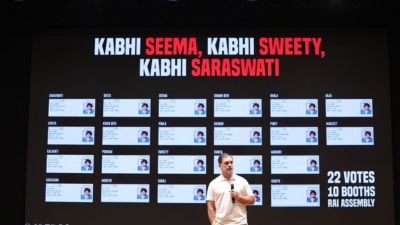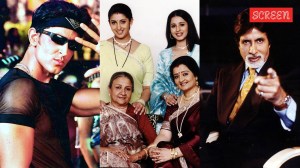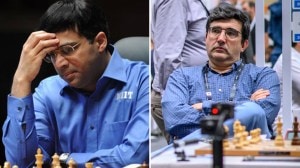Celebrate 50 years of freedom with Sonia
The irony of it. The tragic, comic irony of it that even as we celebrate the fiftieth anniversary of India's Independence from foreign rule...

The irony of it. The tragic, comic irony of it that even as we celebrate the fiftieth anniversary of India’s Independence from foreign rule, the party that led the freedom struggle should be offering us, as the best thing they have to offer, a foreign prime minister. If you ask the old men who lead the Congress Party ( as I did Sitaram Kesri) how they can be so utterly shameless, so pitifully lacking in national pride, they tell you that Sonia Gandhi is no longer a foreigner. She is an Indian citizen, they say, has been since her late husband decided to become a politician in 1983 and so she must now be considered as Indian as you or I.
This may be good enough for the Congress Party but it cannot be for the rest of us. Sonia Gandhi is Italian, chose to remain Italian until politics and opposition sneers made it absolutely necessary for her to change her passport, and it should shame all of us that out of 900 million people, our leading national party should be able to find only her to lead it and, God forbid, us.
They will tell you that her becoming a primary member of the Congress Party does not mean that she will end up as party president, leave alone prime minister and they will be lying. There is only one reason why the likes of Arjun Singh, N.D. Tewari and K. Karunakaran have been begging Sonia on bended knees for five years to enter politics and that reason is that they hope her charisma’ as leader will bring Congress back to power in Delhi. Besides, we would have to be very naive or very stupid to believe that her own purpose for finally joining politics is merely to be an ordinary member of the party, the kind that paste posters and distribute handbills at election time.
Is it possible for her to be an ordinary member? Is it really possible when we know that even without being a member of the party she had it dancing on her fingertips and every senior leader kowtowing at her doorstep? If you still have doubts, try thinking of a single Congress leader who could question her authority in the fashion, for instance, that Kesri’s authority and that of Narasimha Rao was constantly questioned. Your not being able to come up with a name will give you your answer.
In any case, now that Sonia Gandhi has finally come out of the closet we can afford to discuss her as we discuss other people who seek to rule us. What is she like, Sonia Gandhi? What kind of Indian prime minister would she make? Well, as someone who has lived in fairly close proximity to the Durbar of which she was daughter-in-law and Maharani let me share with you a few of my observations. In the old days when Indira Gandhi was still with us she lived pretty much like Delhi’s other memsahibs do. There were the children to look after, the house to decorate, menus to be ordered, parties to go to in the evenings and since Rajiv was a pilot and not a politician, politics was about the last thing anyone discussed. During the Emergency, Rajiv took the view that it was not such a good thing and expressed it but if Sonia had a view nobody ever found out about it.
Phase Two of her political education’ was as Prime Minister’s wife. And, again nobody ever heard her express a political opinion on any subject nor was she much concerned about the great social causes that the Rajiv Gandhi Foundation now espouses. In fact, if the truth be told bluntly, and this column takes pride in always trying to tell it as bluntly as possible, then it has to be said that much of the sleaze that surrounded Rajiv was directly related to Sonia. Quattrocchi and wife were her friends.
When the Bofors story began to ruin Rajiv’s declining career, Durbar gossip had it that it was mainly Sonia’s friends and relatives who had a hand in the pay off. It now turns out that this was pretty accurate gossip but Madame no longer admits to being best friends with the Quattrocchis. Tch, Tch, Tch. Such a bad thing to lie when you are in politics.
What else can I tell you about Soniaji, India’s possible future ruler? Well, she hates criticism of any kind. She is ruthless with people who she feels dare to criticise her or any member of her family. She likes sycophants. She likes power. She likes beautiful clothes and jewellery and if she has a political thought or economic opinion that goes beyond the banal then she has been very careful not to let anyone hear it. She has, though, been very clever in the self-publicity and image-manufacturing department so the Sonia that the average Indian sees is a tragic widow dragged, kicking and screaming, into public life. The truth is that she does not have to be in public life at all, let us at least accept that. wil¬Ut›P3¼Tt›lieve him for the moment. His critics point out that if Joginder Singh had to take audacious steps like processing the case for prosecuting Laloo Prasad Yadav and the others accused in the 10-year-old Bofors case, why did he do it after Deva Gowda demitted office? The frailty of “Tiger” Joginder Singh’s tenure stems from the fact that besides being a hard task master, he has also set a punishing target for himself of putting the CBI on the fast-track and of wrapping up the multi-crore, transcontinental probes within fixed, often unrealistic, deadlines. He is arguably a man on the move, always on the fax and on the phone but the task before him is a daunting one given the fact that the CBI registers over 1,200 cases a year, a large number of which involve top bureaucrats and politicians. Many CBI officials have begun blaming Joginder Singh for the hastily-prepared indictments that have left many off the hook and say that that while the Director may well contribute to the feeling that the CBI has gone beyond its brief, he may have done it at the cost of a declining conviction rate and of crumbling chargesheets.
The redeeming factors in Joginder Singh’s tumultuous tenure may be the fact that, if anything, he cannot be described as a status-quoist Director. He has shown some signs of autonomy, like the occasion when he announced the names contained in the secret Bofors papers without taking anyone in Government into confidence. Unlike some of his predecessors, he did not believe in playing safe and keeping half-a-dozen people in Government informed about every important decision.
Joginder Singh retires from the post of CBI Director in October this year, but whether he will survive until that date remains a source of much speculation.
And perhaps he can do with some advice from his own treatise, Ways of Success and Happiness in Life, on how to traverse the difficult months ahead.





- 01
- 02
- 03
- 04
- 05


























